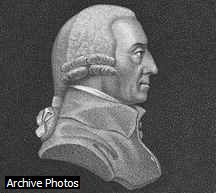.
Based on Merriam-Webster's
Collegiate® Dictionary
Use the BACK button
on your browser to return
footwork
skillful dealing or maneuvering; tactics
form,
formed,
forming,
forms
procedure (a manner of proceeding; a way of performing
or effecting something) as determined or administrated by regulation or
custom; the shape and structure of an object
Free Market Economy
Scottish philosopher Adam
Smith ,
who first set forth the essential economic principles that undergird this
system. In his classic An Inquiry into the Nature and Causes of the
Wealth of Nations.(1776),
Smith sought to show how it was possible to pursue private gain in ways
that would further not just the interests of the individual but those of
society as a whole. Society's interests are met by maximum production of
the things that people want. ,
who first set forth the essential economic principles that undergird this
system. In his classic An Inquiry into the Nature and Causes of the
Wealth of Nations.(1776),
Smith sought to show how it was possible to pursue private gain in ways
that would further not just the interests of the individual but those of
society as a whole. Society's interests are met by maximum production of
the things that people want.
In a now.famous
phrase, Smith said that the combination of
self interest, private property and competition among sellers in markets
will lead producers "as by an invisible hand" to an end that they did not
intend, namely, the well being of society. English philosopher Thomas Hobbes
believed similarly; that society exists for
the sake of its members as individuals and should only be judged according
to criteria.(standards,
rules).established
by them, We
the People as individuals.
A Free Market Economy is an economic system in
which individuals, rather than government, make the majority of decisions
regarding economic activities and transactions. Individuals are free to
make economic decisions concerning their employment, how to use or accumulate
capital, what expenditures to make, and whether to use their resources
now or to save them for later consumption. The principles underlying.free-market
economies are based on 'non-intervention by government'.economics
and can be traced to the 18th century British economist Adam Smith. According
to Smith, individuals acting in their own economic self-interest will maximize
the economic situation of society as a whole, as if guided by an "invisible
hand." In a free-market economy the government's function is limited to
providing what are known as "public goods" and performing a regulatory
role (*) in certain situations.
Public goods, which include
defense, law and order, and education, have two characteristics: consumption
by one individual does not reduce the amount of the good left for others;
and the benefits that an individual receives do not depend on that person's
contribution. An example is a lighthouse. One individual's use of light
provided by a lighthouse does not reduce the ability of others to use it.
In addition, the lighthouse owner cannot restrict individuals from using
the light. The latter illustrates the "free-rider" phenomenon of public
goods, both those who helped pay for the lighthouse and those who did not
will enjoy the same amount of light. The "free-rider" problem can be eliminated
if governments collect taxes and then provide public goods.
Government's role in a free-market
economy also includes protecting private property, enforcing contracts,
and regulating certain economic activities. Governments generally regulate
"natural monopolies" such as utilities or rail service. These industries
require such a large investment that it would not be profitable to have
more than one provider. Regulation is used in place of competition to prevent
these monopolies from making excessive profits. Governments may also restrict
economic freedom for the sake of protecting individual rights. Examples
include laws that restrict child labor, prohibit toxic emissions, or forbid
the sale of unsafe goods.
Proponents of free-market economies
believe they provide a number of advantages. They see free-market economies
as encouraging individual responsibility for decisions and they believe
that.economic freedom
is essential to political freedom. In addition, many people believe
that free markets are more efficient in economic terms. Free markets provide
incentives both to individuals to allocate resources, such as labor and
capital, among the most productive uses, and to firms to produce goods
and services that the public wants, using the most efficient means of production.
A Free-market economy needs also
to be a compassionate one, ensuring basic social values, such as alleviating
poverty, while at the same time checking anything threatening the survival
of political freedom. compare 'managed
economy'.comprised
with Microsoft® Encarta® Encyclopedia 99. © 1993-1998 Microsoft
Corporation. All rights reserved.
.
I n d e x o f
s i t e
.
|